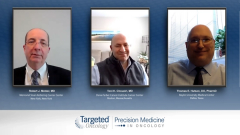
Dosing Strategies for Maximum Efficacy With Len + Pembro
Dosing strategies to achieve strong efficacy and ameliorate adverse events with the combination of lenvatinib + pembrolizumab in metastatic clear-cell renal cell carcinoma.
Episodes in this series

Robert J. Motzer, MD: Tom, you’ve used lenvatinib for over a decade and are probably 1 of the heaviest users of lenvatinib in the United States. What has been your take on dosing of the lenvatinib and adverse effects within the class that you see as favorable or unfavorable for lenvatinib in combination, with everolimus and pembrolizumab?
Thomas E. Hutson, DO, PharmD: You all hit on things correctly. Diarrhea, hypertension, and fatigue are key ones. I’ve never run into a situation, thank goodness, where any type of renal proteinuria has resulted in an impairment and kidney function that impacted the ability of the patient to receive other therapy. Mind you, many of our patients have impaired kidney function with 1 kidney, and we insult them with IV [intravenous] contrast and other things that can precipitate worse things.
As far as tolerability goes, some of the newer, more active agents have stepped up a little the degree of adverse effects that patients experience, whether that’s with the cabozantinib-type drug as a single agent or in combination. Same with lenvatinib-everolimus or lenvatinib-pembrolizumab. We go into those therapies starting with an idea that over 50% of patients require dose reductions. I’ve found that instructing the patient at the beginning and painting a picture for them that as a field, we try to start at the highest dose possible in most situations to get them to that first scan, to see maximum benefit. The expectation is that more than half of people will require fine-tuning of the dose or a dose reduction.
To start with the lenvatinib, I understand that there may be a formulation difference in the tablets. But for the lenvatinib-everolimus combination, when you come with the blister pack, you have dose levels. It becomes a very easy way to lower from 18 to 14 and then 10. We’ll see how that gets packaged out there, but it’s ease of use from that perspective. It’s something I’ve noted in my patients. If you go into therapy with the right mindset, trying to optimize the efficacy by maintaining dose intensity but understanding and making sure the patient understands that if they are experiencing an adverse effect, to bring it to our attention. That is expected in some regard.
In the clinical trials, half of patients did require dose reduction. And as Toni mentioned, the discontinuation rate by doing so is low enough that it makes you feel that, “Hey, if someone runs into adverse effects, I can dose reduce. I can handle it with supportive care to the point that the majority of patients are able to stay on therapy.” The frequency of this happening in the clinical trials is high, and patients still get a benefit. You have a lot of evidence that when you talk to your patient, they shouldn’t be afraid. Sometimes patients are if lowering the dose means they’re not going to respond. You have evidence to say that that’s not the case. We need to make the therapy tolerable to you so you can stay on it for as long as possible. We shouldn’t worry as much that it’s somehow going to get a lower efficacy. It’s a doable regimen.
To be honest, 1 of the drivers is something we haven’t mentioned: the experience of the prescriber. The newer drugs aren’t necessarily out there as long. Many of the prescribers aren’t as familiar with them. As we learn with sunitinib, sorafenib, and pazopanib that some of the adverse effects that were most troubling at the beginning of the approvals when they were first used have become less and less. We see adverse-effect profiles reduce as we’ve done later trials with these agents as comparators. There’s a learning curve when it comes to these agents. But the lenvatinib, although there are toxicity concerns, isn’t so far out there that it couldn’t be used in our patients.
This transcript was edited for clarity.








































